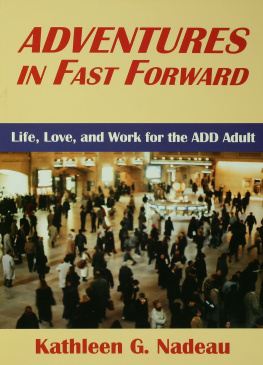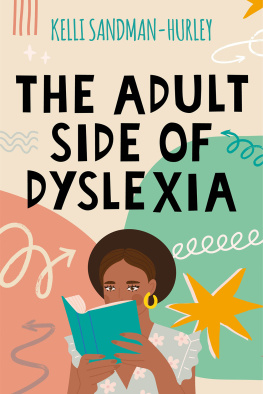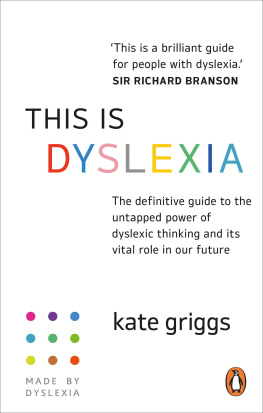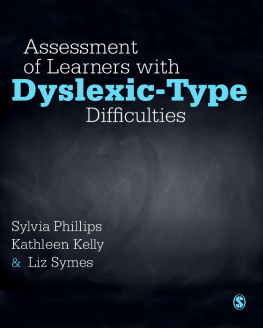Kathleen Nosek - Dyslexia in Adults: Taking Charge of Your Life
Here you can read online Kathleen Nosek - Dyslexia in Adults: Taking Charge of Your Life full text of the book (entire story) in english for free. Download pdf and epub, get meaning, cover and reviews about this ebook. year: 1997, publisher: Taylor Trade Publishing, genre: Home and family. Description of the work, (preface) as well as reviews are available. Best literature library LitArk.com created for fans of good reading and offers a wide selection of genres:
Romance novel
Science fiction
Adventure
Detective
Science
History
Home and family
Prose
Art
Politics
Computer
Non-fiction
Religion
Business
Children
Humor
Choose a favorite category and find really read worthwhile books. Enjoy immersion in the world of imagination, feel the emotions of the characters or learn something new for yourself, make an fascinating discovery.

- Book:Dyslexia in Adults: Taking Charge of Your Life
- Author:
- Publisher:Taylor Trade Publishing
- Genre:
- Year:1997
- Rating:4 / 5
- Favourites:Add to favourites
- Your mark:
- 80
- 1
- 2
- 3
- 4
- 5
Dyslexia in Adults: Taking Charge of Your Life: summary, description and annotation
We offer to read an annotation, description, summary or preface (depends on what the author of the book "Dyslexia in Adults: Taking Charge of Your Life" wrote himself). If you haven't found the necessary information about the book — write in the comments, we will try to find it.
Author Kathleen Nosek offers dyslexic adults a unique approach that gets to the heart of the biggest problem they facethe shame and battered self-esteem resulting from decades of struggling with this frustrating and often misunderstood learning disability.
Dyslexia in Adults: Taking Charge of Your Life — read online for free the complete book (whole text) full work
Below is the text of the book, divided by pages. System saving the place of the last page read, allows you to conveniently read the book "Dyslexia in Adults: Taking Charge of Your Life" online for free, without having to search again every time where you left off. Put a bookmark, and you can go to the page where you finished reading at any time.
Font size:
Interval:
Bookmark:
Kathleen Nosek

To my beloved grandson, Chris,
and to all the parents and grandparents who continue to hope.
Copyright 1997 by Kathleen Nosek
All rights reserved.
No part of this book may be reproduced in any form or by any means
without written permission from the publisher.
Published by Taylor Trade Publishing
An Imprint of the Rowman & Littlefield Publishing Group
4501 Forbes Blvd., Suite 200
Lanham, Maryland 20706
Distributed by National Book Network
Library of Congress Cataloging-in-Publication Data
Nosek, Kathleen.
Dyslexia in adults : take charge of your life / Kathleen Nosek.
p. cm.
Includes bibliographical references.
ISBN 978-0-87833-948-8
1. DyslexiaPopular works. I. Title.
RC394.W6N67 1997
616.85'53c21 96-29589
CIP
Printed in the United States of America
by G. Reid Lyon, Ph.D.
Dyslexia in Adults is a critical achievement and a major contribution to helping us understand both the agony of dyslexia and the joys of being able to push forward and succeed despite significant difficulties learning to read, write, or spell. Our society is one in which print is ubiquitous and the ability to decipher words on the page a substantial prerequisite to learning in school, feeling good about yourself, going to college, and obtaining meaningful employment. Reading is a skill that most Americans take for granted. For many the path to reading fluency and the knowledge that reading makes accessible is unencumbered and devoid of the frustration, fear, and embarrassment that are constant companions of the dyslexic.
Dyslexia is simply not very well understood by those who have it, and it is even less well understood by teachers, employers, and the public at large. In many ways, the disorder is an invisible one. It goes unnoticed in many ways because it is unexpected and because an individual with dyslexia wants it that way. It is unexpected because the person who is having a tough time applying the right sounds to letters and letters to words and reading sentences and passages is frequently bright and talented in many areas. It is hard for many people to understand that someone who is a wonderful listener, a talented mathematician or musician, an engineer, an orthopedic surgeon, or a successful actor can have difficulties learning to read. This is because to most people reading is simple, and it is paradoxical to think that someone who is adept in many intellectual pursuits would have a tough time deciphering words on a page. Unfortunately, being bright and talented is a double-edged sword for many with dyslexia. The same brightness that provides dyslexics with outstanding conceptual and problem-solving skills in some areas also intensifies their own perceptions of how they differ from their peers. As Kathleen Nosek points out so eloquently in this book, they perceive themselves as stupid and often as worthless.
To be able to understand a problem, you have to unravel its mysteries, debunk the myths that grow up around it, and explain clearly and cogently what we know about it and what we do not know. This is what Ms. Nosek has accomplished with this book. In a most lucid way, she lets the reader experience the frustration, failure, and fear that is so frequently encountered by those with dyslexia. Her insightful and candid interviews with adult dyslexics provide a unique window to this complex and baffling disorder and, for the first time, allow the reading public to really understand what it is like. This alone is an achievement. But this book goes far beyond this critical first step of helping us walk in the shoes of the dyslexic. Ms. Nosek is a scholar in her own right, and she painstakingly weaves into the fabric of this volume the essentials of our scientific understanding of dyslexia. I can not emphasize how important this is. For many years, those with dyslexia as well as the general public have received information about the disorder that is piecemeal and frequently inaccurate. At best the information is incomplete, and at worst much of the information that masquerades as science is more akin to voodoo.
This is frustrating for a researcher who has studied dyslexia since 1975 but even more frustrating and cruel to those with dyslexia who are desperately trying to understand why reading is so darn difficult. It is human nature to search desperately for the cause and even more desperately for the cure. Realizing this, Ms. Nosek provides outstanding reviews of what we really know from responsible scientific inquiry and replicated studies and how this information applies to the lives of those with dyslexia and their parents, teachers, spouses, employers, and even their own children. For many years, the National Institute of Child Health and Human Development at the National Institutes of Health (NIH) has been supporting basic and applied research studies of dyslexia. This work is now beginning to bear fruit, and we are really beginning to understand why dyslexia occurs, how many children and adults it affects, its developmental course, its prognosis and outcomes, and most importantly, how it can be diagnosed and treated. Unfortunately, those of us in the research community have not yet figured out how to translate this scientific information into language and examples that make common sense. Thankfully Kathleen Nosek can, and she puts this talent to great use in this book. She explains what we know and do not know and links this knowledge to the lives and experiences of individuals with dyslexia and their loved ones. The greatest compliment to the scientific community is to have its members discoveries and work improve and enrich the lives of others. In this book, Ms. Nosek has provided a channel through which this can actually happen, and I am indeed grateful.
G. Reid Lyon, Ph.D.
The National Institute of Child Health and Human Development
The National Institutes of Health
My heartfelt thanks to the volunteer parents, grandparents, and professionals who do make a difference with their selfless gift of time, energy, and out-of-pocket expenses for the cause of the learning disabled.
I also want to thank the adult dyslexics who contributed their personal stories to Dyslexia in Adults: Howard Rescot, Linda Reymond, Tim Lane, Andy Nadel, Lynne Ginsburg, Dr. Lynn Weiss, Margaret Baker, Jo Ann Haseltine, Brian Center, and Sheri Harlan are all very special to me.
Special thanks to Janna Oddleifson, who contributed the Hull Specific Language Disability Screening material; the National Adult Literacy and Learning Disabilities Centers contribution to the informal screening device for adult dyslexics; Bob Hannigan, Ron White, Lorraine Russell, John Gibbons, Elaine Williams, and Cheryl Harris, who contributed Adult Dyslexics Speak Out about Dyslexia; the LDA Adult Issues Committee, who analyzed the report from They Speak for Themselves; and G. Reid Lyon, a professional trailblazer who isnt afraid to speak the truth.
And most of all, thanks to my husband, Bill, who prays this is my last book on dyslexia... but knows otherwise.
The logical sequel to The Dyslexic Scholar is a book about the dyslexic child all grown up. What happens to him? Does he simply vanish into the larger society, or does he by some magical gift become extraordinary?
The reality of dyslexia is this: the dyslexic fares no better, no worse than the general population after graduation from high school. Some dyslexics attend and complete college. Others get a full-time job and eventually have families. And some dyslexics waver between going to school and developing a career, not able to bring cohesion to either choice. There are still others who fall by the wayside. These dyslexics never leave home, work at menial jobs (or not at all), and cannot get their act together.
Font size:
Interval:
Bookmark:
Similar books «Dyslexia in Adults: Taking Charge of Your Life»
Look at similar books to Dyslexia in Adults: Taking Charge of Your Life. We have selected literature similar in name and meaning in the hope of providing readers with more options to find new, interesting, not yet read works.
Discussion, reviews of the book Dyslexia in Adults: Taking Charge of Your Life and just readers' own opinions. Leave your comments, write what you think about the work, its meaning or the main characters. Specify what exactly you liked and what you didn't like, and why you think so.








